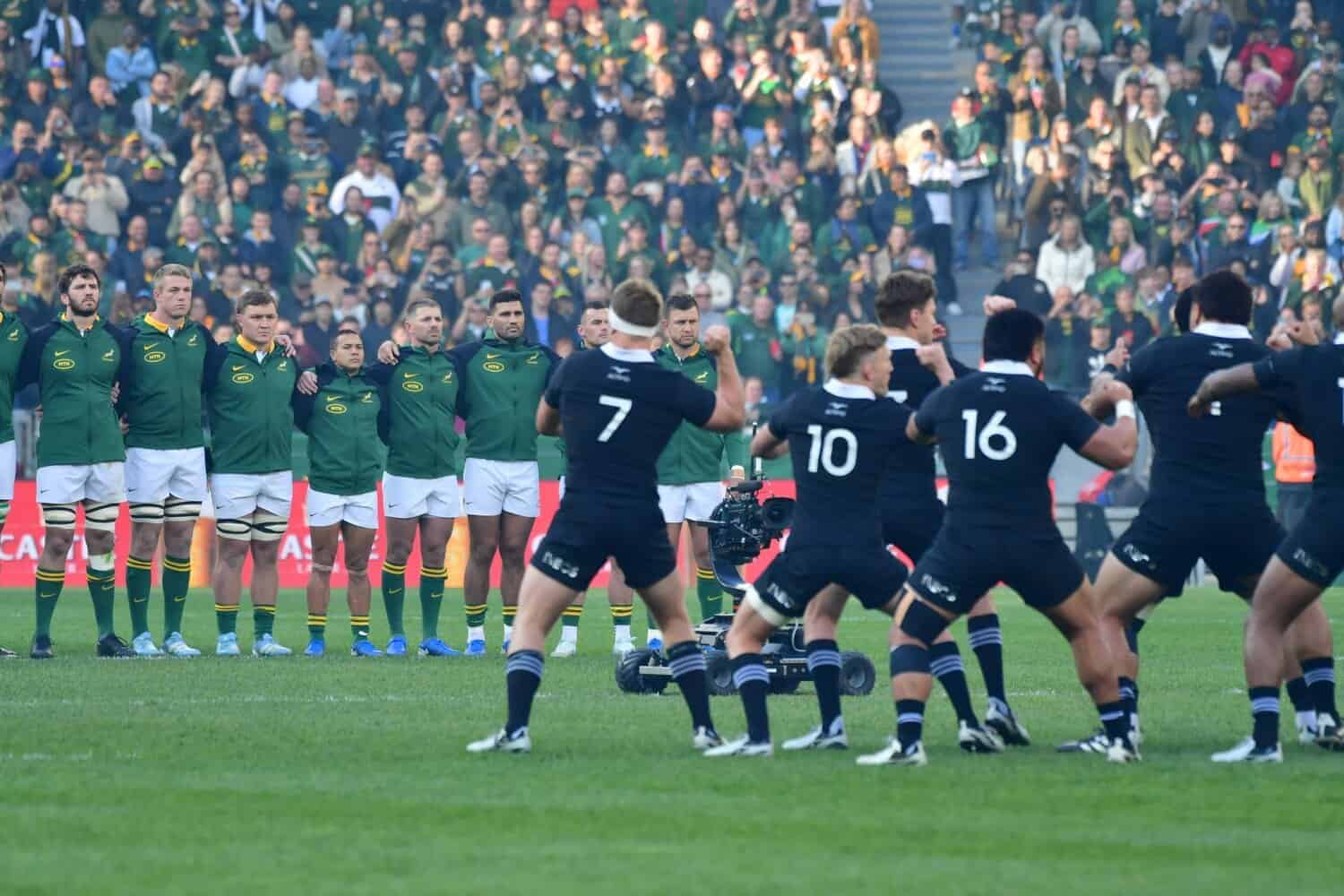The wait is over, and the rivalry is back in its most traditional form. All Blacks Tour of South Africa 2026 has been confirmed for August and September, an eight-match epic that includes four Tests against the Springboks and four clashes with South Africa’s United Rugby Championship franchises, with the fourth Test at a neutral venue to be announced and Twickenham widely viewed as the leading option.
This is no ordinary series, it is a revival of rugby’s touring soul. Next year marks 30 years since New Zealand’s last major tour of South Africa, an eight-game journey that ended in a 2-1 Test series win for the visitors, and now the two most decorated nations in the sport will meet again in a multi-week schedule that brings back the cadence and theater of classic tours.
Why this tour matters to rugby’s greatest rivalry
Organisers have billed it as Rugby’s Greatest Rivalry, and it is hard to argue. The Springboks and All Blacks will meet in a four-Test showdown that adds depth, momentum swings, and emotional beats that a one-off encounter cannot match, and for supporters it promises a layered narrative from first whistle to last.
SA Rugby CEO Rian Oberholzer captured the scale of the occasion, noting the rivalry’s long arc and its shared history.
“This fierce competition between two very proud nations has delivered more than a century of drama on rugby fields across the world, including two Rugby World Cup finals,”
he said, adding that the 2026 tour will rekindle a friendship with South Africa’s greatest adversaries.
For the players, it is a bucket-list experience. Back-to-back World Cup winning captain Siya Kolisi called it unforgettable.
“These are the tours we have only heard of. To experience this for the first time, where it is like a Lions tour, is unbelievable for us as a group,”
said Kolisi, urging supporters to welcome travelling All Blacks fans and to show the world what South Africa is about.
All Blacks captain Scott Barrett echoed the blend of respect and intensity that defines the fixture.
“This is a huge rivalry, and one that is founded off mutual respect, but for 80 minutes these are two teams that every time they play there is everything on the line,”
he said, calling the tour format a stage for fans at home and on the road.
How the tour reshapes the 2026 calendar
SANZAAR has set a new course for the next five years, and 2026 is the pivot. There will be no Rugby Championship next year, since the August to September window is reserved for multi-week international tours, and the All Blacks tour to South Africa is the headline act in that window.
The governing body confirmed The Rugby Championship will return in 2027, 2028, and 2029, including a full tournament in the 2027 Rugby World Cup year, which is a first. SANZAAR also rubber-stamped the Nations Championship for 2026, 2028, and 2030, bringing together the Six Nations teams, the four Rugby Championship sides, and likely Japan and Fiji in July and November blocks.
The long discussed global season remains out of reach until 2031. That delay matters at club level, where South Africa’s URC sides have wrestled with player availability and workload, and while rest periods have been agreed in recent years, the lack of a shared off-season continues to squeeze schedules across competitions.
Australia had indicated openness to moving The Rugby Championship into a February and March window to help align calendars, but the plan did not gain unanimous support, with New Zealand reported as the final holdout in the discussions. For now, administrators and coaches will keep balancing club and country demands through the current cycles.
The fixtures and venues at a glance
Eight matches, three confirmed Tests on South African soil, and one neutral venue Test to conclude the tour. The schedule sets a tempo that blends midweek intensity with high-stakes weekends, and it gives supporters in Cape Town, Durban, Pretoria, and Johannesburg a front-row seat.
- Friday 7 August: DHL Stormers v New Zealand at DHL Stadium, Cape Town
- Tuesday 11 August: Hollywoodbets Sharks v New Zealand at Hollywoodbets Kings Park, Durban
- Saturday 15 August: Vodacom Bulls v New Zealand at Loftus Versfeld, Pretoria
- Saturday 22 August: First Test – South Africa v New Zealand at Ellis Park, Johannesburg
- Tuesday 25 August: Lions v New Zealand at Ellis Park, Johannesburg
- Saturday 29 August: Second Test – South Africa v New Zealand at DHL Stadium, Cape Town
- Saturday 5 September: Third Test – South Africa v New Zealand at FNB Stadium, Johannesburg
- Saturday 12 September: Fourth Test – South Africa v New Zealand, venue to be announced
Three iconic South African venues are confirmed for the Tests, Ellis Park in Johannesburg, DHL Stadium in Cape Town, and FNB Stadium in Johannesburg. The fourth Test will be played on neutral ground, with an announcement to follow, and Twickenham is widely viewed as the most likely host.
What it means for the Springboks
A tour of this length changes selection and preparation rhythms. The Springboks must navigate midweek fixtures and keep a Test squad humming, a challenge that can expand opportunities for squad players while sharpening combinations ahead of the series-defining weekends.
There is also emotional heft in welcoming the All Blacks for a classic tour. The last comparable inbound schedule for New Zealand in South Africa produced a 2-1 Test series result for the visitors, and South African supporters will wrap this tour in history, context, and pride, which is a competitive force of its own.
South Africa’s URC franchises stand to gain as well. As Oberholzer pointed out, franchise players and their fans have not hosted international opposition like this since 2009, and facing the All Blacks at home is both an examination and a showcase for talent across the four clubs.
What it means for the All Blacks
New Zealand will lean into the rhythm of a true tour, a sequence of matches that tests depth and resilience. Midweek games against the URC four set a physical baseline and offer a proving ground for combinations, before the intensity rises into three packed weeks of Test rugby in South Africa and a neutral finale.
Scott Barrett’s emphasis on mutual respect and relentless competition frames the All Blacks mindset. A series of this scope asks for adaptability, and it rewards teams that learn faster than the opposition across consecutive weeks, a hallmark of traditional tours that modern calendars rarely allow.
The bigger SANZAAR picture
Beyond the tour itself, the 2026 to 2030 cycle carries notable milestones. The Rugby Championship will be staged in 2027, 2028, and 2029, then paused again in 2030 to accommodate international tours in the August and September window.
The Nations Championship arrives in 2026, 2028, and 2030, bringing fresh context to July and November. SANZAAR’s chief executive Brendan Morris called the calendar bold and dynamic, underlining a commitment to deliver world-class rugby every year for supporters and broadcasters.
There is short-term certainty, even if the global season remains a horizon target. For the Rugby Championship teams that continuity matters, and it means that after the 2026 tours and Nations Championship windows, the southern hemisphere will be back on familiar terrain in 2027 with a full pre World Cup tournament.
Key takeaways for fans
If you are plotting annual leave, match travel, or simply the best weekends on the couch, three points stand out.
- There is no Rugby Championship in 2026,
- the All Blacks will play four Tests against the Springboks within an eight-match South African tour,
- the fourth Test venue will be neutral and confirmed in due course.
Ticketing and access
Tickets for the tour, including bundles, will go on general sale early next year. Fans can sign up for priority access and early information at greatest-rivalry.com, a valuable step for those eyeing multiple fixtures or premium seats in Johannesburg and Cape Town.
Demand is expected to be intense given the rarity of a traditional tour. Springbok and All Blacks supporters frequently travel for this rivalry, and a neutral venue finale adds a destination match that will attract international interest.
Context from 2025 and what comes next
South Africa won The Rugby Championship this year, a reminder of how fine the margins are at the top and how quickly momentum can swing between World Cup cycles. The 2026 tour occurs outside the Rugby Championship framework, but it will be seen by many as a referendum on depth, coaching alignment, and tactical clarity.
In the coming days and weeks SANZAAR and the national unions will share more detailed schedules and operational information. The announcement of the neutral venue will sharpen travel plans and set the stage for a finale with a global feel, and all signs point to an unforgettable September finish.
For now, the outline is clear. Four URC franchise matches to set the tone, three mighty Tests in South Africa’s most storied stadiums, and one neutral clash to close a tour that restores the slow burn and high drama of rugby’s golden traditions.
Rugby’s Greatest Rivalry, as SANZAAR and both unions have styled it, is more than marketing. It is a commitment to give supporters the cadence of a proper tour, the space to live the story from one week to the next, and the reassurance that even in a packed calendar there is still room for history to breathe.






